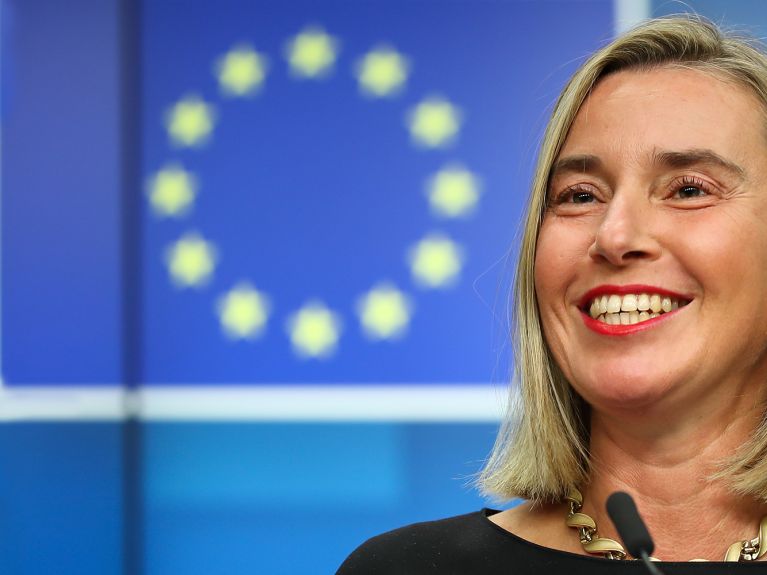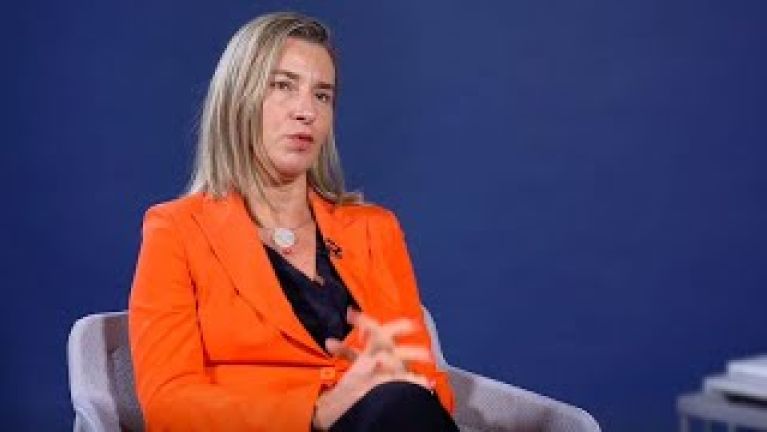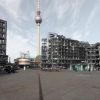Lifesaving medicine for the world
Europe needs to be aware of its collective potential and use it, says Federica Mogherini.

During these last five intense years as the EU’s High Representative for Foreign Affairs and Security Policy, I have had the privilege of seeing Europe through our partners’ eyes. And yes, I have seen contradictions and shortcomings. But most of all, I have seen through the eyes of the rest of the world, what we Europeans today tend to forget, to take for granted: that with all our problems and limits, with all the things we have to change and improve, we are still ‘the place to be’. Our European Union is today the best place where you can live, on earth.
So yes, I believe we Europeans are very well positioned to make the case for peace and understanding. Because our history tells us it is simply smarter. And that making peace is always more convenient than making war. Nothing idealistic about it, we are pragmatic people. We simply know, out of our own experience, that peace is better than war. Common sense, one would say. And yet, building peace is today one of the most difficult and challenging tasks one could imagine. The wind blows in the opposite direction. You need to make the case. You need to explain the ‘why’ of things you would have taken for granted. Things that children get immediately, grown-ups less so. You wouldn’t imagine how useful it has been for me over these years discussing world politics and global issues with my daughters around the kitchen table.
Focusing on real life, real change
We need to invest in this young generation, in their wisdom and their energy. We need to invest in those who work every single day to build respect, dialogue, understanding, peace – patiently, stubbornly, without caring too much about visibility but focusing on substance, on real life, on real change.
The real peace process happens on the ground – with women and men, communities, reaching out and crossing the line of mistrust, starting to move from hate to mutual respect. Peace needs to be built, even when there is absence of war. And it is probably the most difficult and important challenge we have. Here comes, to me, the importance of culture in building peace.
Dieses YouTube-Video kann in einem neuen Tab abgespielt werden
YouTube öffnenThird party content
We use YouTube to embed content that may collect data about your activity. Please review the details and accept the service to see this content.
Open consent formWhen you say ‘culture’ one often thinks of museums and classical music – rightly so, especially here in Germany, or in Italy. But our culture is much more than that. It’s who we are. It’s our identity. Our traditions, our beliefs, our language, our food. The way we move our hands, and we dress. The lullabies our grandparents used to sing for us when we were children, and that we sing to our own. The street art of our teenagers. The novels we read, and those we dream of writing. The movies we like, and even our favourite TV series. Our culture is who we are, individually and collectively.
The stronger it is, the less we are afraid of losing it, the less we feel threatened by diversity, the more we are open to dialogue, respect and understanding. All those that see a danger in multicultural, open societies, are telling you that they believe their culture, their identity, is not strong enough to meet the other, without getting lost.
Culture is the strongest antidote to hate and conflict.
This is why I believe that investing in culture, in all its aspects, is the strongest antidote to hate and conflict. Culture constitutes the bricks with which peace can be built. Not only because culture can be the most powerful vehicle for emotions and feelings – that remains the easiest way to realise that your ‘enemy’ is a human being. But also because all those with a strong, self-confident cultural identity do not fear the other and are ready to listen and understand without running the risk of getting lost in translation.
This is why during these five years in office I have introduced cultural diplomacy among the foreign and security policy tools of the EU. To me it was simply the most obvious thing to do. But at first, many were extremely sceptical. Then I believe everybody realised that culture is one of the most powerful assets we have – especially as Europeans – to promote peace.
An extremely effective bridge builder
First of all, because culture is an extremely effective bridge-builder. It can go where other tools can’t even dare to imagine going – to feelings. You can dance to music that is composed by someone living in a country that is at war with yours. You can eat the same food your enemy eats. That is – can be – an extremely powerful door opener, an entry point to seeing the human being beyond the definition of enemy. And that is, I believe, the first, essential step to building peace.
But culture is also an incredible engine for economic sustainable development, and as such it can play an essential role in preventing conflicts, creating jobs and opportunities for many, and helping in the post conflict reconciliation, recovery and reconstruction phase. It’s surreal that a continent like ours, that knows so well the economic potential of culture, has not used this powerful tool in its foreign and security policy before.
Without the European Union this crazy world we live in would be an even more dangerous place.
I am proud that now, with European cultural diplomacy, we are accompanying the economic development of cultural activities worldwide – which are also an impressive resource for the empowerment of women and girls – and also the use of culture as a vehicle for peacebuilding and reconciliation. Not to mention the extraordinary work that we have started to do with UNESCO to preserve and protect cultural heritage in conflict areas – an initiative that is so relevant on both the economic and the peacebuilding front.
Do we need a reset for Europe? I’ve seen our Union from the inside, and from the outside, through our partners’ eyes. I’ve worked with all my different hats on, in all the institutions – the Commission, the Council, the Defence Agency, with the Parliament. I have seen and heard things I would have liked to not see and hear and lived some very frustrating moments. Every single day had its difficulties and problems to be managed and solved. Inside, and outside. Not easy. But I have loved every single moment of these five years, and I am proud of how we managed to navigate these difficult times. We have always tried to be on the right side of history – a pretty lonely place to be, these days, and the fact that we were there made it less lonely for others, that could never have managed to be on that right side of history without us. We have always chosen our battles, not looking just at those we could win, but first and foremost at those that were worth fighting for. And without us, without the European Union, this crazy world we live in would be an even more dangerous, unequal, conflictual place.
There are things we cannot be really proud of, and I believe we really need to change them, starting with our own politics sometimes. But let us make no mistake. The potential we have, is that of a lifesaving medicine for the world. And once you have that potential, it becomes a responsibility – especially if the state of the world is not exactly that of being in perfect shape. We need to be aware of our collective potential and use it. If we don’t, we will regret it. Because a skill that is not used tends to get lost. And we are not living in times where we can afford to lose any of the positives that we could build. It’s a collective responsibility that we have, towards ourselves and towards the rest of the world.
Federica Mogherini is an Italian politician who served as the EU’s High Representative for Foreign Affairs and Security Policy from November 2014 to November 2019. She was Italy’s Foreign Minister from February to October 2014. This article is based on a speech that she gave in December 2019 when recognised with the Theodor Wanner Award by ifa (Institut für Auslandsbeziehungen). The article was taken over from the Culture Report Progress Europe 2020 which is published by the ifa.
www.ifa-publikationen.de/en/Periodicals/Culture-Report/Reset-Europe.html



